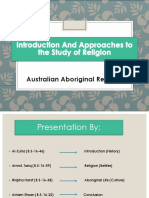Thukeri
Thukeri
Uploaded by
Claudia Sepúlveda ZambranoCopyright:
Available Formats
Thukeri
Thukeri
Uploaded by
Claudia Sepúlveda ZambranoCopyright
Available Formats
Share this document
Did you find this document useful?
Is this content inappropriate?
Copyright:
Available Formats
Thukeri
Thukeri
Uploaded by
Claudia Sepúlveda ZambranoCopyright:
Available Formats
Thukeri
told by Veena Gollan
This is a story about two men who lived on the shores of Lake Alexandrina. They belonged to the Ngarrindjerri people. The two men set off in their bark canoe to go fishing on the lake. They travelled along on the calm, cool waters until they came to their favourite fishing place, called Loveday Bay, where they always caught the best and most delicious bream fish. In their language, this fish is called Thukeri. They found a good sheltered spot among some high reeds. They had made their own fishing lines, called nungi, from cords they had made from the reeds. They used very sharp bird bones for hooks. They knew the women were collecting vegetable plants to eat with the fish. As the day went on the two men sat there catching more and more fat, juicy Thukeri. They were having such a wonderful day catching so many fish and wanted to keep catching more and more, but the canoe was almost full and looked like it would sink. As they paddled in closer to shore, they could see a stranger in the distance. He seemed to be walking straight towards them. The two men looked at each other; what if this stranger wanted some of their beautiful, juicy Thukeri? They were greedy and decided not to share with the stranger. They decided to keep all the fat, lovely Silver Bream for themselves and quickly covered the fish up with their woven mats so that the stranger would not see them. When the stranger came up to the two men he said, 'Hello, brothers. I haven't eaten anything at all today. Could you spare me a couple of fish?' The two men looked at each other and at the mats hiding the Thukeri. They turned to the stranger and one of them said, 'I'm sorry, friend, but we caught only a few fish today and we have to take them home for our wives and children and the old people, because they are depending on us. So, you see, we can't give you any.' The stranger stood there for a long while and then started to walk away. He stopped, turned around and stared at them. 'You lied,' he said. 'I know that you have plenty of fish in your canoe. Because you are so greedy, you will never be able to enjoy those Thukeri ever again.' The two men stood there, puzzled, as the stranger walked away into the sunset. They shrugged their shoulders, then quickly took off the mats and began to gut the fish. But as they did this, they found that these beautiful silver Thukeri were so full of sharp, thin bones that they couldn't eat them. 'What are we going to do? We can't take these home to our families, they'll choke on them.' So the two men had to return home in shame with only the bony fish. When they got home, they told their families what had happened. The old people told them that the stranger was really the Great Spirit called Ngurunderi. Now all the Ngarrindjeri people would be punished for ever, because the two men were so greedy. And so today, whenever people catch a bony bream, they are reminded of long ago, when Ngurunderi taught them a lesson.
Why the stories are told
told by Warren Foster
My name is Warren Foster, I come from the Yuin-Monaro tribe of Wallaga Lake, far south coast of New South Wales. Why these stories are being told is because they keep our culture alive. Keeps us living and knowing that we're living. 'Cos these stories they were handed down by word of mouth for generations upon generations for thousands of years. The reason that we tell these stories is to know where we're coming from. Gives us an identity of the people. And if we know where we're coming from, we know where we're going. As long as we keep telling these stories we know that our culture is alive and running strong through our veins. Why I like telling the stories is because it's keeping the culture alive. As I get older, I'm going to pass it down to younger generations so that they get interested in it and that they keep the culture going. I'd like to see more young blackfellas get right into their culture and start learning more about their culture. Knowing their stories, their songs and dance and art. Keep it alive. (Warren Foster. Wallaga Lake, New South Wales, 1998)
Why the stories are told
told by Aunty Beryl Carmichael
My name is Beryl Carmichael and my traditional name is Yungha-dhu. I belong to the Ngiyaampaa people, come from the Ngiyaampaa nation and the area we're in now belongs to Eaglehawk and Crow. I'm a storyteller as well and all the stories have been handed down to me by my people. I am now custodian of about twenty-eight stories. The stories are a wonderful and a valuable tool, an education tool in teaching our children. The 'Dreamtime' stories as they are referred to today, we didn't know that there was such names for them. Because when the old people would tell the stories, they'd just refer to them as 'marrathal warkan' which means long, long time ago, when time first began for our people, as people on this land after creation. We have various sites around in our country, we call them the birthing places of all our stories. And of course, the stories are embedded with the lore that governs this whole land. The air, the land, the environment, the universe, the stars. The stories that we are passing and talking on today, we are hoping that, some way, it will help our people-and our children, our young people in particular-to get a better understanding about the lore that governs our lives today. No matter what we do, there is always guidance there for us and the guidance comes through in the stories. And the direction that we are giving to our young people on how we expect them to grow up. How to listen to the old people, but also, never to be disobedient. We must never be disobedient; we must always obey the instructions of our old people and people in authority; always do the right thing; never be greedy; never be a thief and so on. So all these little things are embedded in the stories to our children. That's why the stories are so powerful as an education tool when we're teaching our young kids. We must always refer back to the stories because they're the ones that's going to give them the guidance that they need today.
You might also like
- The Inuit Thought of It - Amazing Arctic InnovationsDocument40 pagesThe Inuit Thought of It - Amazing Arctic Innovationslindsay191111No ratings yet
- The Happiest Refugee BookletDocument18 pagesThe Happiest Refugee Booklethenry.fu1No ratings yet
- Aboriginal Chapter 5Document24 pagesAboriginal Chapter 5carlosisgeorgeNo ratings yet
- Deep Creek Flora and Fauna - Thomas Cromarty - 2121983 1Document3 pagesDeep Creek Flora and Fauna - Thomas Cromarty - 2121983 1api-525724560No ratings yet
- Jarmo-Packet Student Instructions WebDocument32 pagesJarmo-Packet Student Instructions WebUrvashi BarthwalNo ratings yet
- MFvys8VpIQ - Social Studies SBA SampleDocument16 pagesMFvys8VpIQ - Social Studies SBA SampleShehreese67% (3)
- 'OldNew World' - Close Analysis Poetry BookletDocument41 pages'OldNew World' - Close Analysis Poetry BookletKilljoy WayNo ratings yet
- Year 5 RE Summer One - Sikhism What Is The Best Way For A Sikh To Show Commitment To God.199911722Document1 pageYear 5 RE Summer One - Sikhism What Is The Best Way For A Sikh To Show Commitment To God.199911722OnyxSungaNo ratings yet
- Kondili The Whale TeachinDocument6 pagesKondili The Whale TeachinRenee FranksNo ratings yet
- Convicts in Australia: by Simone SimmonsDocument10 pagesConvicts in Australia: by Simone Simmonsfiorela 13No ratings yet
- Basil The Rat WorksheetDocument7 pagesBasil The Rat WorksheetMiguel Magalhaes100% (1)
- Emily and The Big Bad Bunyip - Kathryn DunbarDocument4 pagesEmily and The Big Bad Bunyip - Kathryn DunbarS TANCRED0% (1)
- Hyde Greek PreviewDocument73 pagesHyde Greek PreviewVanessa HaliliNo ratings yet
- Arctic Community Nunavut Unit PlanDocument6 pagesArctic Community Nunavut Unit Planapi-402508151No ratings yet
- The Hobbit by J.R.R. Tolkien: Summary in Urdu/HindiDocument11 pagesThe Hobbit by J.R.R. Tolkien: Summary in Urdu/HindiRida Hamid100% (1)
- Sse 4215 Forward Planning Document J Spillman 2Document5 pagesSse 4215 Forward Planning Document J Spillman 2api-258500655No ratings yet
- Pick & Drop PolicyDocument3 pagesPick & Drop Policycrazybilal43% (7)
- 2nd Vatican CouncilDocument9 pages2nd Vatican CouncilJohnson Lopez100% (1)
- NCORT BLS For HCW 2015Document28 pagesNCORT BLS For HCW 2015Monysyha Atri100% (1)
- The Nigerian Grundnorm Based On KelsonDocument14 pagesThe Nigerian Grundnorm Based On Kelsoniykeinana75% (4)
- 81 Great-Barrier-Reef US StudentDocument5 pages81 Great-Barrier-Reef US StudentLisandra Matos0% (1)
- The Great Barrier Reef: By: Maddie and JuliaDocument10 pagesThe Great Barrier Reef: By: Maddie and Juliapressroom100% (1)
- Deep Creek Conservation ParkDocument3 pagesDeep Creek Conservation Parkapi-5286912370% (1)
- Notes JST in Case Back UpDocument15 pagesNotes JST in Case Back UpMHKgaming100% (1)
- Mikmaq Place Names Updated 5 March 2019 1Document9 pagesMikmaq Place Names Updated 5 March 2019 1Frederika Bismarck100% (1)
- Inductive Study SheetDocument2 pagesInductive Study SheetlullanosNo ratings yet
- 8thsyllabus17 18Document2 pages8thsyllabus17 18api-291800932No ratings yet
- How Wolves Change Rivers: WorksheetDocument2 pagesHow Wolves Change Rivers: Worksheetapi-2811955850% (1)
- Alibrandi's Fingerprint: by Kumaresh MuthubalasuriyarDocument5 pagesAlibrandi's Fingerprint: by Kumaresh MuthubalasuriyarKumaresh MuthuNo ratings yet
- Gospels WorksheetDocument2 pagesGospels WorksheetEmily JohnNo ratings yet
- Nathan Ko - Act 1 - (1-40) Someday by Drew Hayden TaylorDocument22 pagesNathan Ko - Act 1 - (1-40) Someday by Drew Hayden Taylornathank753No ratings yet
- Sally-Mangan SADocument30 pagesSally-Mangan SAAlex NichollsNo ratings yet
- Aboriginal and Torres Strait Islander Connection With The LandDocument30 pagesAboriginal and Torres Strait Islander Connection With The Landapi-375968665No ratings yet
- AutobiographyDocument5 pagesAutobiographyapi-299953605No ratings yet
- Pastoral Circle: "See, Judge, Act": HistoryDocument2 pagesPastoral Circle: "See, Judge, Act": HistorySelle FlorendoNo ratings yet
- Native American Creation StoriesDocument8 pagesNative American Creation Storiesfbeverley686No ratings yet
- Tuck Everlasting ScrapBookDocument14 pagesTuck Everlasting ScrapBookJohn RoasaNo ratings yet
- Chap - 2 - Aboriginal SpiritualityDocument34 pagesChap - 2 - Aboriginal SpiritualityJohn ClementsNo ratings yet
- Rita Joe I Lost My TalkDocument2 pagesRita Joe I Lost My Talkapi-39473323250% (2)
- C 05 B Japan Under The ShogunsDocument29 pagesC 05 B Japan Under The ShogunsManahil AmirNo ratings yet
- Australian Aboriginal ReligionDocument25 pagesAustralian Aboriginal ReligionHuda HamidNo ratings yet
- (SUNY Series in Global Modernity) Allen Chun - Forget Chineseness - On The Geopolitics of Cultural Identification-State University of New York Press (2017)Document298 pages(SUNY Series in Global Modernity) Allen Chun - Forget Chineseness - On The Geopolitics of Cultural Identification-State University of New York Press (2017)Henry MoncrieffNo ratings yet
- Year 8 RE Source Analysis Skills PP 2019Document14 pagesYear 8 RE Source Analysis Skills PP 2019Sasha Volesky0% (1)
- Modern History Assesment 1Document18 pagesModern History Assesment 1api-357662510No ratings yet
- First Fleet Project FinalDocument4 pagesFirst Fleet Project Finalapi-247083785No ratings yet
- Early HumanDocument6 pagesEarly HumanphanipawanNo ratings yet
- Visual Essay Educ 530Document6 pagesVisual Essay Educ 530api-497818521No ratings yet
- Looking For Alibrandi - Film TechniquesDocument3 pagesLooking For Alibrandi - Film TechniquesSerenaNo ratings yet
- EMT611 AT3 (AutoRecovered)Document11 pagesEMT611 AT3 (AutoRecovered)Dylan TaylorNo ratings yet
- Evelyn Wolfson Inuit Mythology PDFDocument2 pagesEvelyn Wolfson Inuit Mythology PDFMarcelNo ratings yet
- Ancient Sumer Flip BookDocument9 pagesAncient Sumer Flip Bookapi-198624210No ratings yet
- Alex CV Ais W Cover LetterDocument4 pagesAlex CV Ais W Cover Letterapi-258699610No ratings yet
- Two Expeditions Into The Interior of Southern Australia - Volume I by Sturt, Charles, 1795-1869Document134 pagesTwo Expeditions Into The Interior of Southern Australia - Volume I by Sturt, Charles, 1795-1869Gutenberg.orgNo ratings yet
- Paragraph WritingDocument5 pagesParagraph WritingfruittinglesNo ratings yet
- Creating The Self: Theme of Identity in The Poetry of Derek WalcottDocument7 pagesCreating The Self: Theme of Identity in The Poetry of Derek WalcottMargottNo ratings yet
- Te Körero Mö Tamatehura: Whakapapa (Genealogy)Document12 pagesTe Körero Mö Tamatehura: Whakapapa (Genealogy)William J Elliott100% (1)
- R3 - To Build A FireDocument20 pagesR3 - To Build A Fireclaudio cascoNo ratings yet
- My Adventure at LeangDocument4 pagesMy Adventure at LeanghariyantoNo ratings yet
- Murray Darling Basin Teacher KitDocument126 pagesMurray Darling Basin Teacher Kithannah.king31No ratings yet
- Hawaiian Hula `Olapa: Stylized Embodiment, Percussion, and Chanted Oral PoetryFrom EverandHawaiian Hula `Olapa: Stylized Embodiment, Percussion, and Chanted Oral PoetryNo ratings yet
- Unit-Overview-Abor-Final-25-10-1 1Document25 pagesUnit-Overview-Abor-Final-25-10-1 1api-359895239No ratings yet
- Narrative AssessmentDocument2 pagesNarrative Assessmentdaviss429908No ratings yet
- Match The Words To The Pictures.: Name: ............................................Document2 pagesMatch The Words To The Pictures.: Name: ............................................Claudia Sepúlveda ZambranoNo ratings yet
- Welcome To Who Wants To: Be A MillionaireDocument36 pagesWelcome To Who Wants To: Be A MillionaireClaudia Sepúlveda ZambranoNo ratings yet
- What Is Text and DiscourseDocument1 pageWhat Is Text and DiscourseClaudia Sepúlveda ZambranoNo ratings yet
- V VVVV VVV V VV VV VV V VV VVVV V VV VVV VVV V VVVVV VVV VDocument1 pageV VVVV VVV V VV VV VV V VV VVVV V VV VVV VVV V VVVVV VVV VClaudia Sepúlveda ZambranoNo ratings yet
- CRIMINAL LAW 2 BOOK 2 Corpus Jusris Part 1 PDFDocument118 pagesCRIMINAL LAW 2 BOOK 2 Corpus Jusris Part 1 PDFGilbert Ocampo100% (1)
- Valerio vs. Refresca Case DigestDocument3 pagesValerio vs. Refresca Case DigestssNo ratings yet
- Restored - Living A Restored LifeDocument21 pagesRestored - Living A Restored LifeYolanda SofutheNo ratings yet
- 11 10 03 oDocument9 pages11 10 03 oYolanda Janice Sayan FalingaoNo ratings yet
- Madzodzo Et Al v. Minister of Basic Education Et AlDocument2 pagesMadzodzo Et Al v. Minister of Basic Education Et AlKarlo Gonzalo Guibone BatacNo ratings yet
- Valerdi v. Holder, JR., 1st Cir. (2014)Document6 pagesValerdi v. Holder, JR., 1st Cir. (2014)Scribd Government DocsNo ratings yet
- Labor Standards CasesDocument115 pagesLabor Standards CasesMary Joy Gorospe100% (1)
- Behind The Tunes Vol - 1Document146 pagesBehind The Tunes Vol - 1davidNo ratings yet
- The War On The Italian Front - Luigi VillariDocument208 pagesThe War On The Italian Front - Luigi Villaribarbierir100% (3)
- Jackie Rahm Little, 36, Cash BailDocument1 pageJackie Rahm Little, 36, Cash BailPatch MinnesotaNo ratings yet
- Heroics and Ros CatalogueDocument12 pagesHeroics and Ros CataloguejeanvintroiNo ratings yet
- Addison Township Ethics Committee DecisionDocument65 pagesAddison Township Ethics Committee DecisionDavid GiulianiNo ratings yet
- Fasting - Its Virtues and PrinciplesDocument3 pagesFasting - Its Virtues and PrinciplesAhsan Latif AbbasiNo ratings yet
- The Origins of The First World War - Sanet.stDocument405 pagesThe Origins of The First World War - Sanet.stJocaAnaNo ratings yet
- فيو oو ماي تيفي.m3uDocument13 pagesفيو oو ماي تيفي.m3uabashussin52No ratings yet
- Shia Community & The Dhaka Nawab Family Edited by Anas KhwajaDocument5 pagesShia Community & The Dhaka Nawab Family Edited by Anas KhwajaDhaka Nawab Family Digital Library100% (1)
- Chi Ming Tsoi v. CA by YsaDocument1 pageChi Ming Tsoi v. CA by YsaKim B.No ratings yet
- GST CertificateAA271021119495I - RC04112021Document3 pagesGST CertificateAA271021119495I - RC04112021realtyexcelsiorNo ratings yet
- Botong Francisco Dedumo, Dhonmhel Anne Z. Humss-12Document1 pageBotong Francisco Dedumo, Dhonmhel Anne Z. Humss-12Dhonmhel DedumoNo ratings yet
- Blec Cdi 2022 23Document100 pagesBlec Cdi 2022 23Regel Dimo Saclanas100% (2)
- Strahlenfolter Stalking - TI - GREENBAUM SPEECH of D.C.hammONDDocument6 pagesStrahlenfolter Stalking - TI - GREENBAUM SPEECH of D.C.hammONDKurt-SchneiderNo ratings yet
- Waukesha Engine WarrantyDocument4 pagesWaukesha Engine WarrantyastromoNo ratings yet
- SWE BrochureDocument16 pagesSWE BrochureaasishNo ratings yet
- DOJ Analysis of HR 1522Document11 pagesDOJ Analysis of HR 1522Metro Puerto RicoNo ratings yet
- Impact of Russia-Ukraine War On Stock MarketDocument7 pagesImpact of Russia-Ukraine War On Stock MarketSurya ChourasiaNo ratings yet





























































































